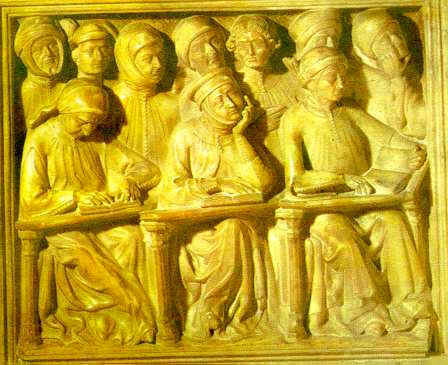|
Text:
Whilom ther was dwellynge at oxenford
A riche gnof, that gestes
heeld to bord,
And of his craft he was a carpenter.
With hym ther was dwellynge a poure scoler,
Hadde lerned art, but al
his fantasye
Was turned for to lerne astrologye,
And koude a certeyn of conclusiouns,
To demen by interrogaciouns,
If that men asked hym in certein
houres
Whan that men sholde have
droghte or elles shoures,
Or if men asked hym what sholde
bifalle
Of every thyng; I may nat
rekene hem alle.
This clerk was cleped hende
nicholas.
Of deerne love he koude
and of solas;
And therto he was sleigh and ful
privee,
And lyk a mayden meke for to see.
A chambre hadde he in
that hostelrye
Allone, withouten any compaignye,
Ful fetisly ydight with herbes swoote;
And he hymself as sweete
as is the roote
Of lycorys, or any cetewale.
His almageste, and bookes
grete and smale,
His astrelabie, longynge
for his art,
His augrym stones layen
faire apart,
On shelves couched at his beddes heed;
His presse ycovered with
a faldyng reed;
And al above ther lay a gay sautrie,
On which he made a-nyghtes melodie
So swetely that all the chambre
rong;
And angelus ad virginem he song;
And after that he song the kynges noote.
Ful often blessed was his myrie
throte.
And thus this sweete clerk his tyme
spente
After his freendes fyndyng
and his rente.
|
Translation:
Once on a time was
dwelling in Oxford
A wealthy lout who took in guests to board,
And of his craft he was a carpenter.
A poor scholar was lodging with him there,
Who'd learned the arts, but all his phantasy
Was turned to study of astrology;
And knew a certain set of theorems
And could find out by various stratagems,
If men but asked of him in certain hours
When they should have a drought or else have showers,
Or if men asked of him what should befall
To anything- I cannot reckon them all.
This clerk was called the clever Nicholas;
Of secret loves he knew and their solace;
And he kept counsel, too, for he was sly
And meek as any maiden passing by.
He had a chamber in that hostelry,
And lived alone there, without company,
All garnished with sweet herbs of good repute;
And he himself sweet-smelling as the root
Of licorice, valerian, or setwall.
His Almagest, and books both great and small,
His astrolabe, belonging to his art,
His algorism stones- all laid apart
On shelves that ranged beside his lone bed's head;
His press was covered with a cloth of red.
And over all there lay a psaltery
Whereon he made an evening's melody,
Playing so sweetly that the chamber rang;
And Angelus ad virginem he sang;
And after that he warbled the King's Note:
Often in good voice was his merry throat.
And thus this gentle clerk his leisure spends
Supported by some income and his friends.
|


